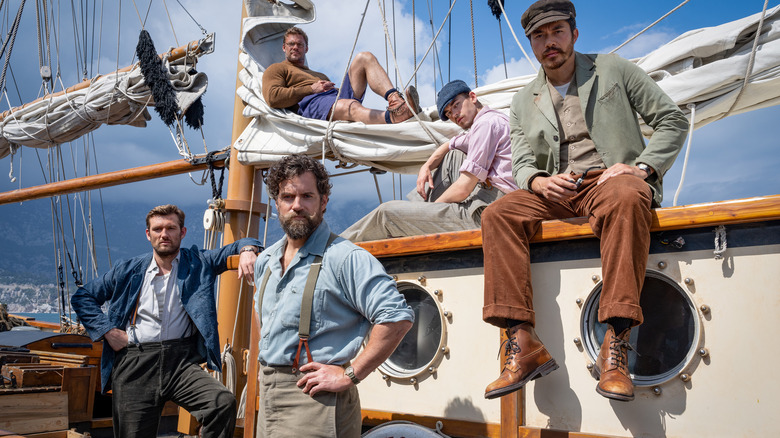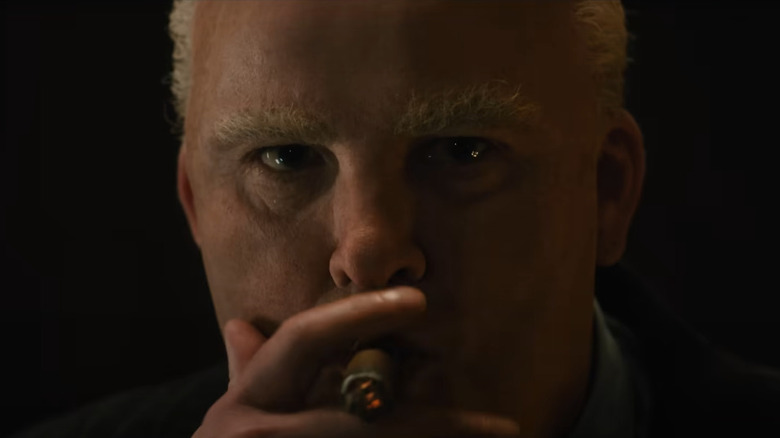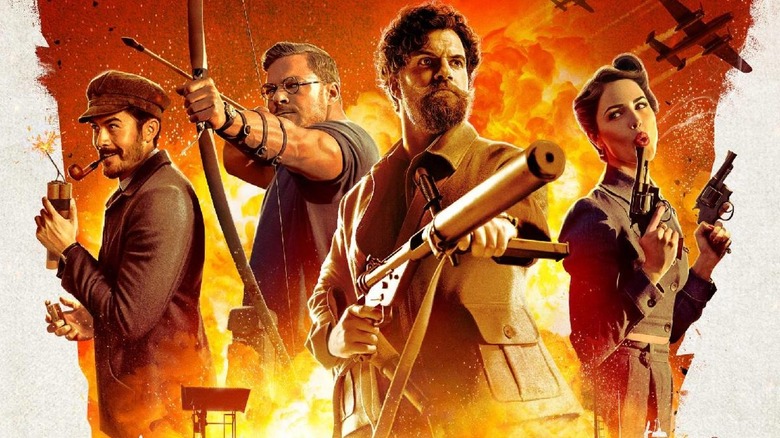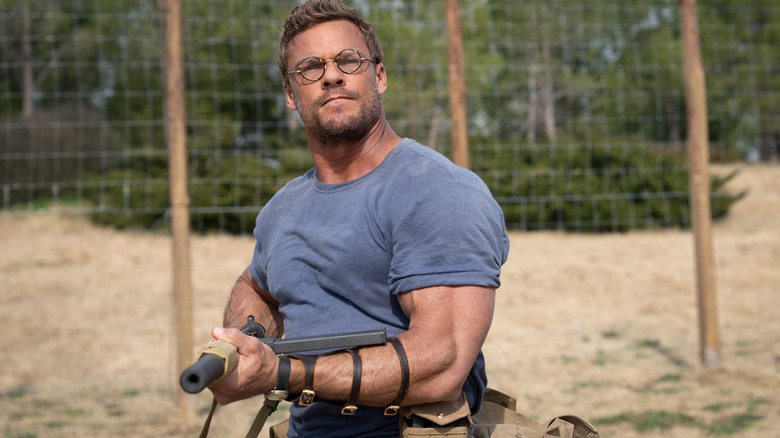The Real-World Heroics Behind The Ministry Of Ungentlemanly Warfare Explained
What do "Saving Private Ryan," "Dunkirk," and "Oppenheimer" — among countless other World War II movies — all have in common? Beyond the obviousness of their shared genre space, it's actually even simpler than that. None of these films would've been possible without one common denominator: the true, real-life heroics that ultimately inspired this year's "The Ministry of Ungentlemanly Warfare." Based on author Damien Lewis' "The Ministry of Ungentlemanly Warfare: How Churchill's Secret Warriors Set Europe Ablaze and Gave Birth to Modern Black Ops," the covert op undertaken by a select group of fearless individuals from all different walks of life only became known to the general public relatively recently. Files kept by the British War Department were finally declassified barely a decade ago and, as it turns out, that was for good reason. This might have been one of the most crucial undertakings of the entire conflict ... even if the actual movie isn't nearly as self-serious or reverential as that might imply. (For more on that, you can read my review for /Film here.)
Even though director Guy Ritchie has his fingerprints all over his latest feature, that only further emphasizes the unique circumstances surrounding this incredible true story. The adaptation plays fast and loose with certain aspects of its events, of course, but the overall nature of the mission and its stakes haven't been embellished in the least. For the history buffs out there with a particular interest in all things World War II, this is for you. None of the following is required material in order to understand or even enjoy this new war movie, but a little background knowledge certainly goes a long way. Here's a spoiler-free look at everything you need to know about the real-life heroics behind "The Ministry of Ungentlemanly Warfare."
Desperate straits
It's the early 1940s: Nazi aggression has triggered a war that rages across all of Europe, the U.S. has remained on the sidelines, and Britain faces the very real prospect of surrender or annihilation in the face of a foe that vastly outnumbers them. Circumstances couldn't possibly be more dire for Prime Minister Winston Churchill (played by Rory Kinnear under mountains of prosthetics and makeup in "The Ministry of Ungentlemanly Warfare"), and so the UK leader falls back on that old axiom — you know, the one about desperate times and desperate measures.
As the film lays out early on, the constant threat of German U-boats patrolling the Atlantic Ocean has become priority #1. Not only have they singlehandedly prevented the United States from entering the war effort, but countless Allied ships — armed for combat and relief — have fallen prey to the underwater threat. The solution? Disrupt the U-boat supply chain beyond repair by taking out certain high-value ships servicing U-boats, by any means necessary. The special ops mission was the brainchild of Churchill and an extremely small circle of trusted military officials (future "James Bond" author and then-British intelligence officer Ian Fleming, played by Freddie Fox in the film, among them), conceived as an off-the-record raid that carried extreme political risk should the perpetrators be discovered. This caution stemmed from the target's location of Fernando Po, a Spanish island home to a port where a number of German and Italian vessels were anchored ... and inconveniently located squarely in neutral territory.
So, to ensure plausible deniability, the fledgling Special Operations Executive (a forerunner to the Special Operations Branch of MI6) recruited Major Gus March-Phillipps, who would assemble a motley crew and perform the first black ops mission in modern warfare. Thus, Operation Postmaster was born.
Meet the team
"The Ministry of Ungentlemanly Warfare" may have taken certain liberties with its screenplay — characters such as Babs Olusanmokun's Richard Heron, Hero Fiennes Tiffin's Henry Hayes, Til Schweiger's villainous Nazi Heinrich Luhr, and Henry Golding's Freddy Alvarez were invented for the film — but the film remains faithful to history in both the broad strokes and the smallest details. Major Gus March-Phillipps (Henry Cavill), Anders "The Dutch Hammer" Lassen (Alan Ritchson), Geoffrey Appleyard (Alex Pettyfer), and a few other men rounded out the team of commandos who would infiltrate the port from aboard a pair of tugboats and, in a slight departure from the stated goal in the film, steal a trio of ships (as opposed to blowing them up) to prevent the Germans from resupplying their fleet of U-boats.
In terms of differences, however, the changes made to spice up history certainly begin to mount the closer we get to the climax. In the movie, Marjorie Stewart (based on a real figure in history and portrayed by Eiza González) and Heron play a crucial role on land as undercover operatives who deceive the local Nazi commander and provide cover for the impending raid with a lavish costume party, but there's no record of such actions. That said, raging parties for soldiers and officers were known to take place aboard the Duchessa, a fact which another SOE operative took advantage of while undercover as a partygoer in order to gain intel on the target prior to the raid. In a fun quirk, the final title cards in the film relate the fact that Stewart and March-Phillipps eventually married one another ... although it doesn't appear they ever worked together on Operation Postmaster specifically.
Still, it's undeniable that this history lesson was practically made for the big screen.
Sequel stories
It's not exactly a spoiler to say that the operation that took place on January 14, 1942, was ultimately a thorough success. All told, the entire mission spanned a total of 30 minutes, inspired no direct combat response from Axis forces in the immediate area, and resulted in no loss of lives whatsoever (all of which are contrary to the events as depicted in the film). The raid went off without any significant hitches and, as a result, proved beyond a doubt that Britain was willing and able to do whatever it takes to defeat the Nazis — even risking the wrath of the Spanish government. For their part, they denounced the theft of the ships as an attack on their sovereignty, but could never actually prove any British ties to the raid.
As for the participants, "The Ministry of Ungentlemanly Warfare" similarly regales viewers with the results of their feats. March-Phillipps, Captain Graham Hayes (perhaps a loose inspiration for Henry Hayes in the movie), Appleyard, and Lassen all received commendations for their heroism, while numerous members of this division went on to perform multiple missions for the SOE throughout the rest of the war. Certain individuals were ultimately killed in action, others were captured and tortured for months, and still others mysteriously went missing, but it's indisputable that the actions of those involved in Operation Postmaster may have shifted the balance of the entire war in the Allies' favor. Be sure to keep that in mind while watching Guy Ritchie, his ensemble cast of A-listers, and the rest of the creative team do their thing on the big screen.
"The Ministry of Ungentlemanly Warfare" is now playing in theaters.



